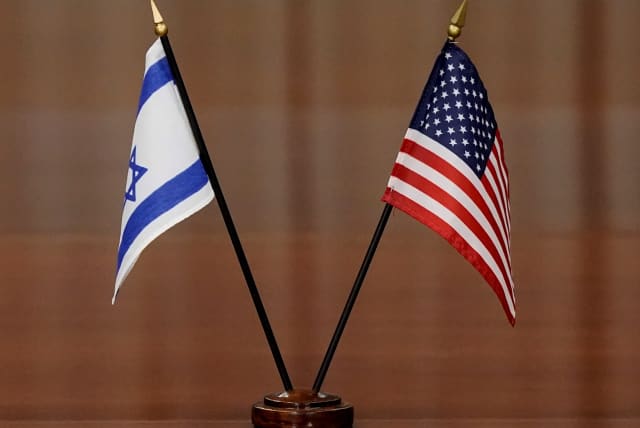Internal Israeli politics could harm US ties, security interests - INSS

There are multiple negative headwinds that Israel will need to cope with in its relations with Washington going forward that could alter bipartisan support.
If the current Israeli government harm’s Israel’s brand as a democracy, it could negatively impact US support to Jerusalem regarding the Iranian nuclear and other threats, the Institute for National Security Studies’ annual report said on Monday.
Presented to President Isaac Herzog, it evaluates the full range of national security threats: from Iran, to Palestinian issues, Hezbollah, Syria and the environment, and to how all of these dilemmas will be impacted by internal Israeli politics and relations with the US.
“In the geo-strategic realm, we identified the special relationship with the US as the greatest challenge before the decision-makers,” INSS Managing Director Tamir Hayman said. “Any harm to [the relationship] will immediately impact Israel’s ability to handle all of the other arenas.”
The report generally headlines threats from Iran, Hezbollah or from the ongoing conflict with the Palestinians.
Could Israel-US relations deteriorate to the point of harming national security interests?
Uniquely, the report for 2023 warned that relations with the US, if not managed properly, could deteriorate to such a point in the future that it could negatively impact critical national security interests for Israel, such as with Iran and the Palestinians.
According to the INSS, there are multiple negative headwinds which the Jewish state will need to cope with in its relations with Washington going forward that could alter what has been bipartisan support for Israel for decades.
The report cautioned that if Israel is viewed by the US as moving more toward authoritarianism by virtue of the current proposed judicial overhaul, which could lead to reducing Israeli minority rights and harming Palestinian interests, this could permanently alienate many Americans who have supported Jerusalem in the past.
“The danger in terms of [Israel’s] international standing arises from the increased competition between the blocs of great powers, which obligate Israel to high-level norms of liberal democracy, and responsible conduct with China and Russia,” the report said. “The danger to Israel’s internal resilience derives from the possibility of the Israeli government changing its policy in the legal realm, regarding liberal norms and internal security policies.”
In other words, if in the past Israel was sometimes criticized for differences on policy with the US regarding the Islamic Republic and settlement issues with the Palestinians, the report explained it was always given a discount for being the only democracy in the region.
IF ISRAEL loses this brand – regardless of whether the current judicial reforms actually harm Israeli democracy – the report said that Jerusalem could already see its traditional “discount” reduced.
This in turn could start “endangering” American support across-the-board, which has traditionally included arms and defense aid, intelligence sharing, general economic support and diplomatic support, including at the UN, it said.
Partially, this is because the potential problems between the US and Israel go far beyond internal Israeli debates over the country’s separation of powers, said the report.
“Increasing polarization and extremism from the two far ends of the political spectrum in the US are eroding the base of political support for Israel,” it said. “The younger generation progressive camp’s seizing a position which rejects the legitimacy of Israel and Zionism, which in its conception is the supreme example of neo-colonialism, alongside the growth of antisemitism and racism, reduce the legitimacy and standing from which Israel has benefited for many years.”
This means that both in the Democratic and Republican parties, anti-Israel or antisemitic groups that were once relegated to the extreme wings with little actual influence are getting larger voices, according to the report.
Some Democrats are viewing Israel in neo-colonialist terms, it said. This means that everything starts from a more negative vantage point. At the same time, some Republicans are suspicious of non-Christian Americans and of using up US money and military power to assist overseas allies, including Israel.
In addition, the report said that both parties, on different levels, are turned off by how close Israel’s relations have been sometimes with China and Russia, including in sharing advanced technologies.
If Israel is perceived as allying itself with authoritarian rivals of the US, while reducing judicial democratic checks and balances to protect minorities and Palestinians, there could be a “perfect storm” that could radically alter American feelings about the Jewish state.
To manage these dilemmas, INSS recommended “emphasizing to the US that Israel belongs to the ‘Democratic camp,’ while broadening the dialogue regarding the mix of diplomacy and technology” to reduce American worries about Israel’s closeness to China and Russia.
In the same vein, the report urged “giving public indications of Israeli support for Ukraine and to analyze widening its support” for Kyiv.
DISCUSSING IRAN itself in detail, the report warned that Tehran’s closer alliance with Moscow following its providing military weapons for use against Ukraine “increased Iran’s security against any Western attack.”
Further, the report said that, “with no [nuclear] limitations from a deal and with no influence from the threat of military action, Iran is bringing about a reality where it is a nuclear threshold state.”
Put differently, the report said that the Islamic Republic is nearing a point where there will be no nuclear technological obstacles left for it to overcome. That would mean that the only thing it would need to do to cross the nuclear threshold would be to make the political decision to bring all of the nuclear weapons’ components together.
While in the past, some INSS officials have supported an imperfect Iran nuclear deal over no nuclear deal, in this report, the institute viewed the negotiations as stalled for so long that the West should officially declare them dead.
Until the West makes this declaration, INSS said that it will be held back from pushing for globally binding snapback sanctions against the ayatollahs.
On the Palestinian issue, INSS said “there is an increased danger of a violent awakening” because of “the absence of any foreseeable solution in the near future as the era of Mahmoud Abbas heading the Palestinian Authority is coming to an end.”
Add in, noted the institute, the large number of “disillusioned young people” with little hope for their future, and this issue could “escalate into a strategic threat” pushing toward “a one-state reality.”
INSS recommended avoiding measures which would provoke the Palestinians, strengthening the PA versus Hamas, allowing more Palestinian building in Area C of the West Bank and empowering the Palestinian economy.
Hezbollah is discussed, but was given less centrality based on the premise that a conflict with Lebanon is currently less likely. Most of the report’s recommendations regarding Israel’s northern neighbor encouraged maintaining the status quo of deterrence, while trying to facilitate some gains for Lebanon from the recent Israeli-Lebanese deal regarding exploiting natural gas in the two countries’ joint maritime waters.
The report also suggested that Israel reduce the publicity of its attacks in Syria as well as continuing to regularly re-evaluate the “war between the wars” policy based on the region’s continually evolving circumstances.
Jerusalem Post Store
`; document.getElementById("linkPremium").innerHTML = cont; var divWithLink = document.getElementById("premium-link"); if (divWithLink !== null && divWithLink !== 'undefined') { divWithLink.style.border = "solid 1px #cb0f3e"; divWithLink.style.textAlign = "center"; divWithLink.style.marginBottom = "15px"; divWithLink.style.marginTop = "15px"; divWithLink.style.width = "100%"; divWithLink.style.backgroundColor = "#122952"; divWithLink.style.color = "#ffffff"; divWithLink.style.lineHeight = "1.5"; } } (function (v, i) { });

